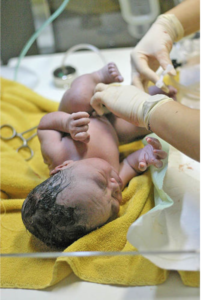When I was practicing, quite a few childless patients requested sterilization: “My profession keeps me too busy”, or “I’m concerned about the state of the world and don’t want to bring a child into a troublesome environment”, or “I don’t think I would be a good mother”. One woman, Elizabeth, came to me with an unusual reason for her tubal ligation. Her husband sat next to her, holding her hand.
“I’m a slow learner. I was in special classes in school. Mom will have to sign the paper,” she explained. “Mom’s not here now, but she’ll sign soon.”
I expressed my concern: “Is this what you want, or is your mom saying that you must get your tubes tied?”
“John and I are happy together. I don’t think we could take good care of a baby. It’s what we both want.” Later, John explained that he was also retarded. “My thyroid didn’t work when I was a baby. My brain didn’t develop right,” he explained woefully. Elizabeth and he met in special ed classes. Neither of them could drive, but fortunately they lived close to the hospital and to my office.
Elizabeth proudly brought me a present at her postoperative visit—a little house that she made at her developmental disabilities program. Although not great art, I placed it on my desk for all to enjoy. I last saw this sweet couple holding hands as they walked along the river pathway.
Not all women are cut out to be mothers—nor men, fathers. Many childfree people are childless by choice, and are happy that way. More and more people are electing to not have kids, but there are some people who become parents by accident. I fear that unintended parenting is more common now since accessing abortion services has become almost impossible for people in many states.
Not all unintended pregnancies have a bad outcome. I remember a conversation at our supermarket. Marian told me “I didn’t plan to be a mother. I was unhappy when I had the positive pregnancy test. But when Joshua was born, I immediately fell in love with him. I’m delighted to be a mother!”
Fred chimed in: “Being a dad is great! Thank you for helping my wife when she was in labor, 4 years ago.”
Some women regret being mothers. It is difficult to quantify maternal regret since it hasn’t been studied until recently. Postpartum Depression (PPD) fortunately usually doesn’t last very long, but is much more common. It may be related to the sudden change in hormones the new mother experiences after giving birth, since a small dose of estrogen sometimes will cure PPD.
A growing proportion of childless adults say they’re unlikely to have kids increased drastically from 2018 to 2023, according to a recent Pew survey. More concerning is that over half (52%) of young people in the USA stated that they are hesitant to have children because of worry over climate change. Recently I talked with a young woman in Bolivia who said that she was not planning on having children because of climate change. I felt sorry for her, and also guilty for living in a rich country whose carbon emissions were causing the Bolivian drought.
© Richard Grossman MD, 2024

